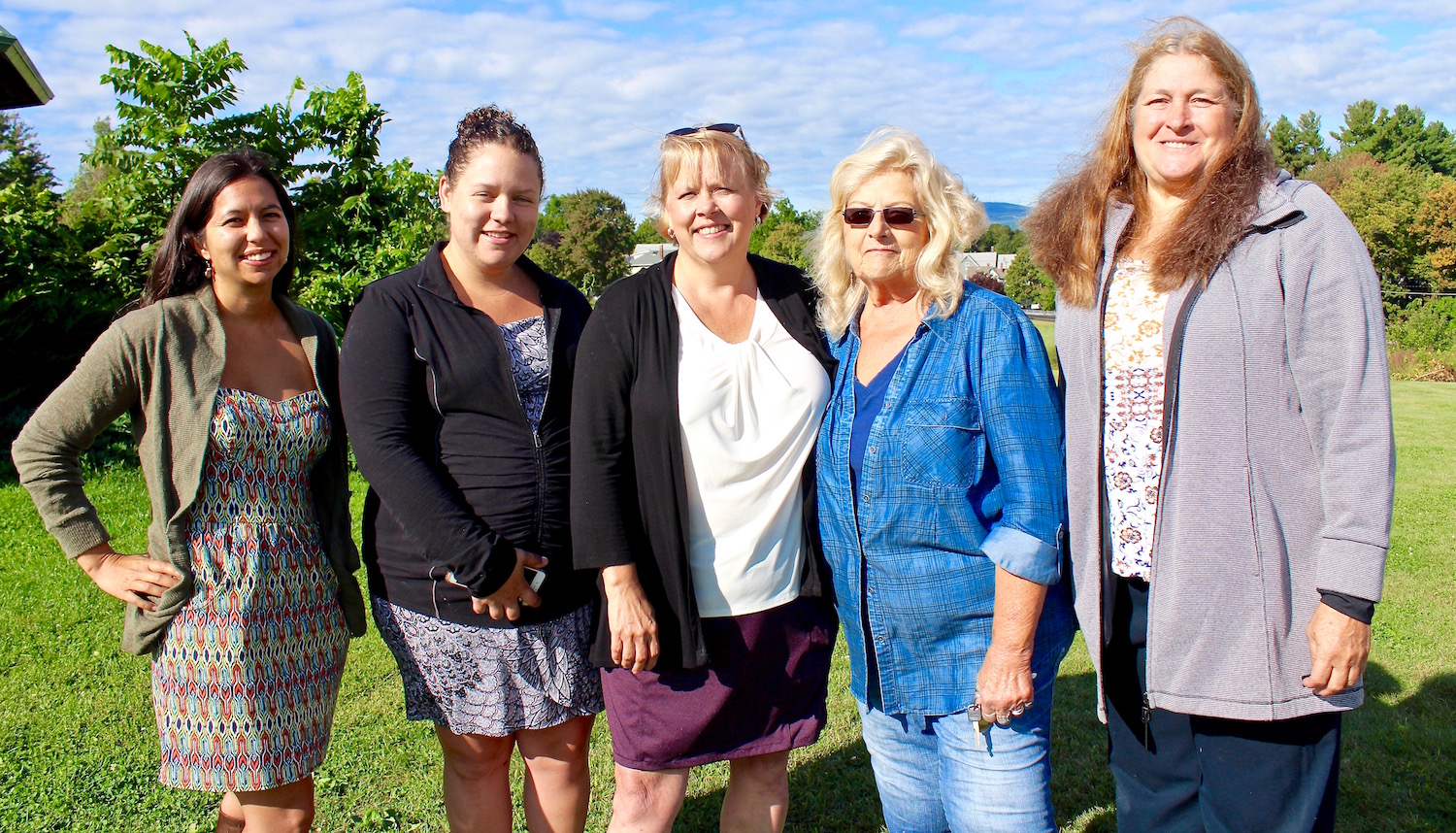
MANCHESTER, NH – We recently met with the five women who are running to represent their wards on the Board of Aldermen – all but one, Tammy Simmons, have a primary on Tuesday. They talked about the issues, what motivated them to run, and how they’d meet the challenges facing the city head on, if elected.
Collectively they bring a wide range of potential experience to City Hall – fire service, education, tech, business management, and the military. Barbara Shaw is an incumbent alderman seeking her fifth term in Ward 9, and the only female currently serving on the board. Betsi Devries is the city’s first and only female fire fighter, and also a former aldermen seeking a return to City Hall to represent Ward 8. Elizabeth Moreau, a former Army medic, and Brenda Noiseux, a proud “tech nerd,” are both first-time candidates, while Tammy Simmons, who has been politically active for many years, wants to expand her reach as a ward alderman.
There is a short list of women who’ve served as aldermen before them, including Mary Sysyn, Leona Dykstra, Elise Francoeur, Jacki Domaigne and Joyce Craig, who is currently running for Mayor. Noiseux says she looked into the history of her ward. She is the fifth woman to run in Ward 7, and only three women from her ward have made it to the general election. If she wins, she will be the first woman to represent her ward.
But it’s not only about being a woman. All five agree that gender should not be a deciding factor for voters, but as women, their experience is what informs the way they think and work collaboratively.
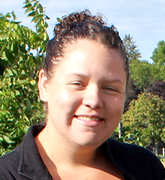
Elizabeth Ann Moreau, Ward 6, former Army medic, currently working for Homeland Security/Immigration: I decided to run for alderman in Ward 6 because I’m putting my roots down in Manchester. We bought our house to raise our children in, and we want to make sure our school district and neighborhood remain a place we’re proud of. Some of the issues constituents have brought up to me are public maintenance, roads, trimming of tree lines, our parks and also the school redistricting and funding for our schools – those in particular have hit home to me because I have a daughter in Green Acres school. Our son, who’s due in November, will be here for 18 years and I do plan to send him through the public school system – I can’t afford private schools here – so I want Manchester to be a place where my kids can get a good education. With that said, I’m also for the tax cap and spending within our means, realigning and adjusting and moving money where it needs most to be.

Brenda Noiseux, Ward 7, tech professional and owner of Bittenby Studios, LLC, a personal creative and consulting services company: One reason I’m running is to bring balance to the board. There are a lot of people who run term after term after term, and we’ve seen a lot of that in Ward 7 because Alderman Shea has been there for more than 20 years. If we want Manchester to be a city that attracts younger families and professionals and businesses, we need to have that representation on the board. I worked in tech for more than 10 years, so if we’re looking to bring technology jobs to Manchester, I have some expertise as to what those folks are looking for, as well as other practices from within the business world that would help us, as far as running a city and creating a plan that will allow us to spend our money creatively and wisely.
We definitely need more proactive communication from City Hall to the constituents. There are a lot of people who no longer read the newspaper because we have younger folks who are online. But in order to get information about what’s happening, people shouldn’t have to rely on a newspaper, or wait for their alderman to knock on their door. I haven’t had a knock on my door in the 12 years I’ve lived in Ward 7. We need proactive engagement in City Hall and more community building.
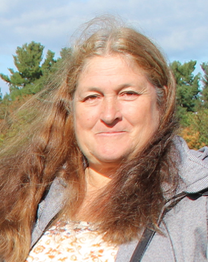
Betsi Devries, Ward 8, retired Manchester Firefighter: I served previously for 10 years on the Board of Aldermen, and I’m running once again because I felt Ward 8 didn’t have a strong voice. I’m a female, but certainly I’ve never had difficulty finding my strong voice on the BOA. There are many issues in our ward – speeding is one that comes up a lot as I go door-to-door, specifically, at the southern end of Brown Avenue. My main reason in running is I want to make sure we’re well represented, and that we have police in our neighborhood patrolling, and that our issues are attended to promptly.
Being alderman is a constituent activity, as in you are there to represent your constituents, and so you need to be available, I’m retired from the fire department, and I want to be that voice for south manchester.
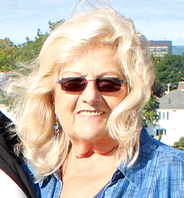
Barbara Shaw, Ward 9, retired teacher and administrator, NH State Rep.: I’m running for my fifth term as alderman in Ward 9, and the main reason I run is because I love working for people – I’m a people person, and have worked closely with many sections of my ward to solve issues and problems. We still have many more to deal with, but for the most part it’s the same issues I hear all over the city – speeding and no communication from City Hall, so I try to be that voice, that liaison, for constituents. I meet with groups throughout my neighborhood and talk to them and we move together on issues. I’ve built up a rapport with my constituents and would like to continue that rapport and continue working for them.
I also think we need to begin to realize Manchester has changed and we need to look outside the box and look for new ways to meet our budgets. It’s very important we remember that time is moving on and status quo means failure. We need to improve and move forward.
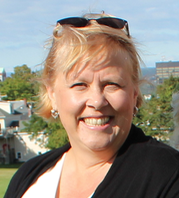
Tammy Simmons, Ward 10, graphic designer, office manager: Someone asked me what triggered me to run for Alderman in Ward 10. I think our spending levels increase too much too fast. In the 20 years I’ve owned my house on Parker Street, my taxes are up 74 percent. I’m not OK with that. I’m not against spending money, I just think we need to spend it wisely. We need priorities and we need to spend more efficiently and we have to decide what we need to do going forward, and have a plan and stick to it; that’s the money side of things. I also realized in talking to people that we lack something as a community. I’m not sure how to put my finger on it, but like Betsi says, you can’t take on the whole city. When it comes down to representing your constituents and being the voice for them and addressing things, should it only be people contacting an alderman when they have an issue, or should aldermen be reaching out to their constituents so that they know more about what constituents are concerned about? I’d like to make sure people in my ward are informed about things. I want to be their voice.
Q. What is the No. 1 issue facing the city of Manchester?
Barbara Shaw: Finding a balance between progress and available revenue, finding a way to work together on a budget that is open and transparent, and still move the city forward without breaking the pockets of the people.
Betsi DeVries: I’ve found as I’ve knocked on doors, a lot of people are concerned as I am about the actual or perceived decline of infrastructure and decline of our school system – they don’t feel academics are up to par and they’re concerned because it reflects on their property values when they go to sell their homes, or it reflects on their neighborhoods. We don’t need to look more than 20 feet away from us to see that things get left behind in Manchester now [a reference to the gazebo at Derryfield Park, which has been blighted by graffiti and other damage]. It’s that slow decline that allows the creep of crime, that allows the creep of neighborhood decline; I think those are our biggest issues, to find that balance – revenues are tight, taxes need to be kept low, people are feeling the squeeze, but we need to get the job done. We we need to think outside the box as Barbara said.
Elizabeth Ann Moreau: We need creative solutions. Coming up with those is our key problem, and a key issue. When it comes to our school problems, maybe we need to look at consolidating schools, bringing teachers up from one level to the next, moving money from one area to another area and coming up with creative ways to problem solve and move around resources, and do what we have to do to stay within the budget.
Brenda Noiseux: Perception is the biggest thing we need to work on. It’s perception of civility, perception of working together, perception of our schools, of our city – there are a lot of wonderful, wonderful things going on in our city and we need to make sure we’re highlighting those. I’m so tired of hearing from people who don’t even live in this city that they’d never move to Manchester, that Manchester is dangerous. We have a lot of really good things going on. We need to promote that about our city, and that doesn’t cost any money to do. That means aldermen have open doors to talk with constituents and have conversations about what we can do that doesn’t always mean spending more money. So we need to work on what can we do to change perception because, in the end, that’s what’s going to kill the city. Whether we have the best schools – Central was just on the list of top 50 schools in NH – but people are like, ‘Oh no, Central’s dangerous.’ Truth is, Central’s a great school, it’s just that perception that’s out there, and we as a city need to work on that. Part of that is how we present from City Hall, and that goes out and bleeds out into the city.
Tammy Simmons: One issue – I don’t think it’s THE issue, but right now, one of the big issues is still the opioid crisis, and I don’t know that the city can solve it, but you can’t ignore it. And yet, it can’t be the only story in the newspaper. So many people think everybody in Manchester is doing heroin and that there are needles everywhere. And I don’t know that that’s the case, but that’s the story that gets played out, and it goes back to the community thing. We need to bring a strong community so that people feel better about living in Manchester. We chose to move here 20 years ago. We could have moved to Bedford, or anywhere, but when we bought a second house we chose to stay in Manchester. This is where I live. I care about the city. How do we get more people to feel better about their community? I think it’s all about community. Our schools aren’t awful. There’s always room for improvement.
Betsi DevVries: But are they declining, which is a question I’ve had from constituents…
Barbara Shaw: No, they’re not. We have the greatest superintendent right now and we have to put our support behind him. He inherited a mess and he’s working hard and doing a great job, but everything takes time, change takes time. The education in this city is top notch, but it’s the perception because of the real estate market that grades the schools in the areas. No matter what school you walk into in this city, education is going on and it’s top notch education. I would stand behind any school in this city and I think if people would just go and not be so picky about every little thing. Like right now on Facebook there’s this huge thing about buses and schedules and kids not getting picked up… it’s the first week of school, it happens every year…
Elizabeth Ann Moreau: My daughter was sent home on the bus even though she’s in the after school program. I was in Lawrence at the time, thank God I have a neighbor who was able to take care of her. It’s something that needs to be handled correctly
Barbara Shaw: That’s communication, it’s got to improve, there has to be top notch communication amongst every department, the city the schools, everything, and it has to be all coordinated, it’s about working together.
Brenda Noiseux: And these are things that don’t necessarily need more money, right? The schools already have processes in place to communicate out, the city has email addresses and an app. There are tools in place whether they need to be consolidated, or better utilized, or promoted, so there are things we can do, even just getting elected out of the gate, that can have a major impact on this city, but we need to have leadership and the vision to get it done.
Barbara Shaw: And as state reps, we have to carry that balance down from the state, because a lot of the problem towns and cities incur is because of downshifting from the state.
Tammy Simmons: And having been a state rep with Barbara, it’s a very interesting process. The majority of New Hampshire are towns, there are very few cities and cities are different than towns. So Bedford might butt right up to my ward, but at the state level some of the things that get passed impact the cities completely differently. Just like I don’t really understand the town process completely because I’ve never lived in a town, there’s a lot to be said in working with the delegation from Concord. I don’t know if we even do that very well. I was in the delegation from Concord and I don’t remember aldermen talking to me about anything, like about what’s going on in Concord. It goes back to that communication thing, and none of these things cost money.
Betsi Devries: Some of our existing communication tools don’t work well for citizens, and I’ll give you a brief example: As a citizen I haven’t had the opportunity to have a department head immediately return phone calls to me, so I’ve used means every other citizen uses, sending email to the departments. And of those three departments I’ve contacted, I’m one-for-three in having heard back; I didn’t recently hear back from police or planning. The one I give kudos to is the city clerk’s office. They are fabulous. If someone is concerned enough to send an email to a city department, someone needs to be monitoring that and making sure the at least everyone gets a return email, otherwise you have disgruntled citizens.
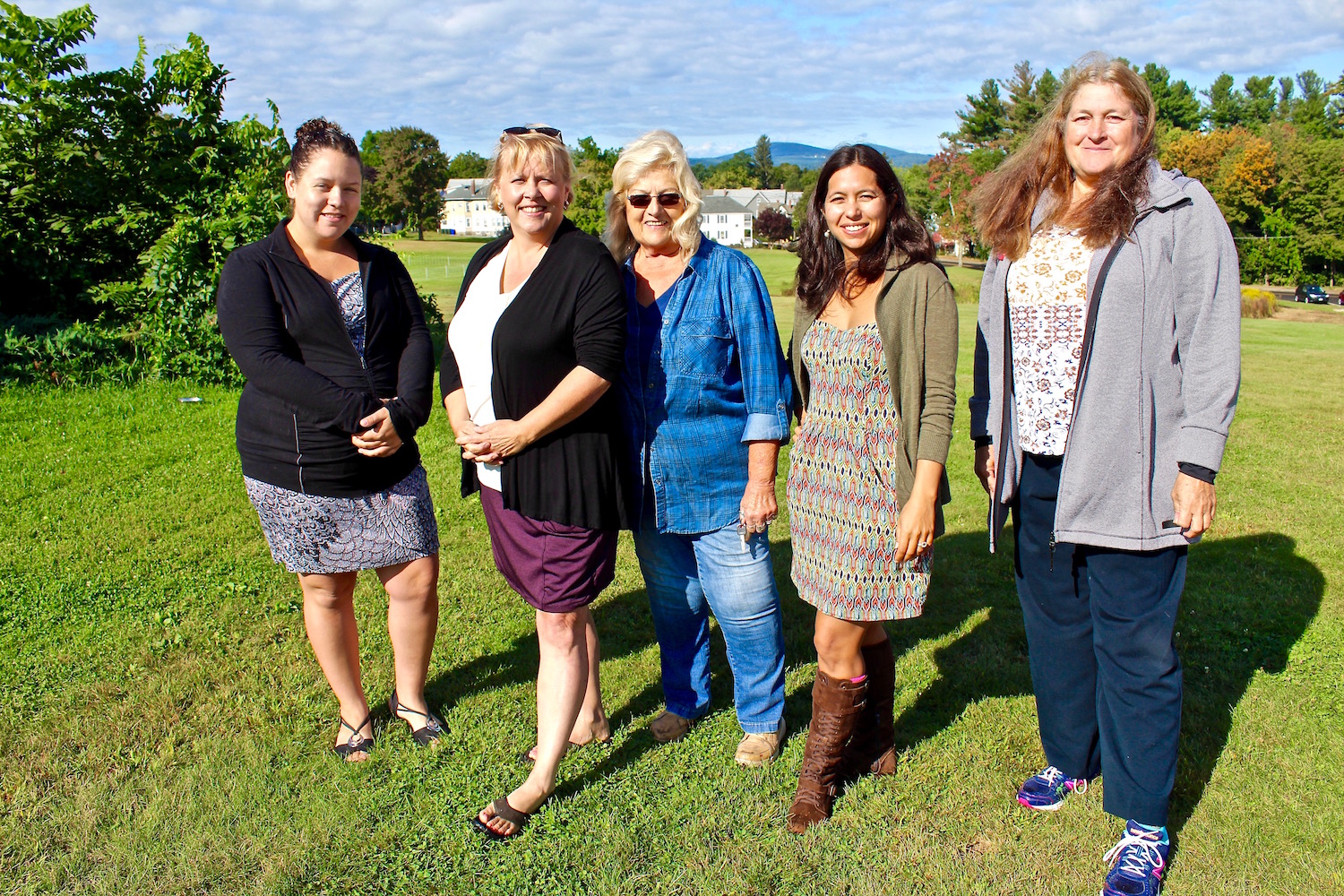
Tammy Simmons: So here’s a question: How do you get a couch picked up?
Betsi DeVries: You call the cherry picker…
Tammy Simmons: OK, so it’s one of my pet peeves. First problem is I think many people don’t know they can’t just put a couch on the sidewalk.
Betsi DeVries: As alderman I used to call all the time for constituents and make the arrangements.
Tammy Simmons: On Parker Street someone put out a mattress, kind of on the bridge, a Christmas tree and a mattress, and I thought how long would that mattress be there before it went away, it was like two months, and I thought the trash guys are driving by, I realize they can’t just pick it up, but you are driving by that mattress getting rained on week after week after week.
Barbara Shaw: It’s not their job…
Tammy Simmons: But why isn’t it their job to communicate with someone in their department, because eventually someone from the city is going to pick it up.
Barbara Shaw: They only have one cherry picker right now, so they’re backlogged.
Tammy Simmons: And I understand, but nobody in the city – including those trash trucks – are alerting that one cherry picker that there’s a couch or mattress, it shouldn’t take three months to pick up a mattress. Shouldn’t there be a process by which a trash guy can let someone know, radio it in, make a report. Having things like that sitting on the side of the road for months, that makes the city look bad.
Brenda Noiseux: And if there’s a cost, someone will argue the city is losing revenue if they pick it up, so you just bill the building owner, and if they pass it on to residents, that’s on them, but people need to be taking more responsibility.
Elizabeth Ann Moreau: Someone dropped off a couple mattresses in the park in my ward. I reported it, and I’m pretty sure they’re still there. I’ll have to check when I go home.
Tammy Simmons: Depending on which ward you live in, there are problems in Manchester with absentee landlords and everyone knows it. Do we notify those property owners of issues, for instance, say you have a building, and say police are going there every week, do we ever tell the property owner that the police or fire department has been there five times in the last six months? The property owner may not have any idea the fire department has been at their house.
Elizabeth Ann Moreau: On Cedar Street we have a duplex down there and there was an OD and I believe the fire department called us for access – it might be a something that falls to property maintenance companies.
Betsi DeVries: I’m not sure it’s still on the books but there used to be a process within the city to notify landlords – we initiated a state law requiring their phone numbers be kept on file but at the same time if you’re dialing a landlord in California they may not care that much about addressing a problem at a property in Manchester, NH.
Barbara Shaw: It’s the state law, it’s the state that has to change the law, our hands are tied. If there’s a vacant house sitting there, and the mortgage company is in Arizona, you call them. They say we have a maintenance company we’ll notify them, two months later, the city calls back and says nobody’s called, they will say that’s not our problem, we called the maintenance company, so it takes three to five years before the city has a right to step in
Brenda Noiseux: It’s easy to look at some of the areas and say it’s low income renters, but in Ward 7 there are a lot of elderly people who can’t necessarily get out and do cleanup on the weekend, or those who maybe had an accident and are disabled. I’d like to see more partnership in the community and the city. We have a neighborhood watch program, only about 15 people who go on a regular basis out of a ward of about 5,000 people. What I’d like to see is more community grassroots efforts, could someone go to that group and say I can’t do this myself, is there someone who can help? Many who live in renter communities who never grew up owning a house knowing the kind of responsibilities of home ownerships, when others in the community are people out and about, you set a positive example for them, and they begin to realize it’s a community effort to keep the neighborhood nice. There are things we can encourage in the community as well, not just things the city that has to do, but we need to work on city processes and community processes and meet in the middle.
Elizabeth Ann Moreau: I think the city should make it more affordable for landlords to rehabilitate their houses to get rid of things like asbestos, and make properties more habitable and bring them up to the current century. I know typically when you make over 50 percent of renovations on a house you get screwed, you have to pay for a sprinkler system – it ends up being not worth it to a landlord, and so they end up leaving properties as they are.
Q: How would you say initiaitives like Safe Station are doing to help the city?
Betsi DeVries: It’s difficult for me to say. I haven’t seen reports or statistics, only anecdotally I’ve heard it’s working well for individuals, but there’s still a lot of frustration from people in the city and public safety on the number of people repeatedly overdosing. We still as a state and federal government need to invest in New Hampshire. Our state doesn’t have services to support people in the community when they do battle to try and overcome addictions. I’ve heard Safe Station is trying its best, but there are people coming from all over the state to Manchester and Nashua. We’re servicing the entire state, so those outside the Board of Aldermen need to step up and be more present for this issue. We can’t do it alone, we’re already spending our tax dollars to take care of outside towns,
Barbara Shaw: I think Safe Station is doing a great job. What I’d like to see is an audit of organizations behind Safe Station. We don’t get reports. I’d like to know how they stand and what the stats are from their organizations. Safe Station is doing a great job, but what happens beyond that?
Tammy Simmons: Going back 2-3 years when this started bubbling up, Safe Station was a good idea. Manchester was the first city where people who wanted to get help could get help. I can’t even fathom what it’s like to be addicted to do a drug; it’s not something I can process, so i don’t try to put myself in their shoes. But if we’ve had 1,500 people in 15 months, that’s 100 people a month, 3 people a day, going for help. It’s obviously doing some good. There will always be some who are relapsing but we can’t just let people die. I’m not going to step back and say well you just die. What’s the success rate in relaying people to different organizations for help? If it’s 1,500 people, and a 10 percent success rate, that means 150 people got help, and I’m OK with helping 150 people. But if we’re talking about all the addicted people from Nashua, Bedford, Amherst, and other places coming to Manchester because we’re the only ones offering help, then we need financial help from those communities. We can’t cover the cost of fixing the state’s addiction problem.
Betsi DeVries: it’s probably similar to past welfare discussions where the welfare burden was shifted to the city of Manchester because we had a system in place that the smaller towns just don’t have. I believe that’s been corrected for the most part, but we as a state do not support individuals in drug programs, which they probably need if they’re trying to stay sober or get sober. We also don’t have the programs needed to support individuals coming out of prison to our halfway houses. There’s a network of individuals trained that have to be there to prevent the burden from landing on our doorsteps, so without proper funding in place at state and federal level, it concerns me that we have become the reception center for many people who are battling addictions, unless of course they aren’t staying here, and just coming here as a cry for help. As I said, I haven’t seen the reports, but I’m concerned. I want to see those reports and do follow up
Brenda Noiseux: I’m a data girl and I love data, but when it comes to reporting, we need to be proactive in the kind of reports and data we want to see. We need someone to take a leadership role to help us see the bigger picture. People are coming here from different municipalities, so which programs are working, which organizations are doing the best – there needs to be oversight to say this is the data we need to figure those things out, otherwise it’s all haphazard.
Some of the data we’re gathering isn’t the right data for analyzing what’s working and what’s needed. That’s up to the city to say this is the data we need in order to show the state that we need x amount of funding, or these three programs we shouldn’t partner with because they’re not seeing results, but these three programs are. So it does come back to data, but we need to be proactive in what data we want to see, so we can put the big picture together.
Barbara Shaw: I want to see more interaction by the city’s Office of Youth Services with teenagers of this city. I want to know why these kids are going to drugs, who’s supplying them with drugs. Kids will talk to you if you get them together in a round table discussion, you’ll get information that needs to be sped up. I just saw where Rochester just set up a peer program to work with teens who are addicted, who’ve been addicted. When you have these young kids who have no idea what’s going to happen or where they’re going, I think they need help and the Office of Youth Services needs to get more involved with schools and have more support groups for these kids.







